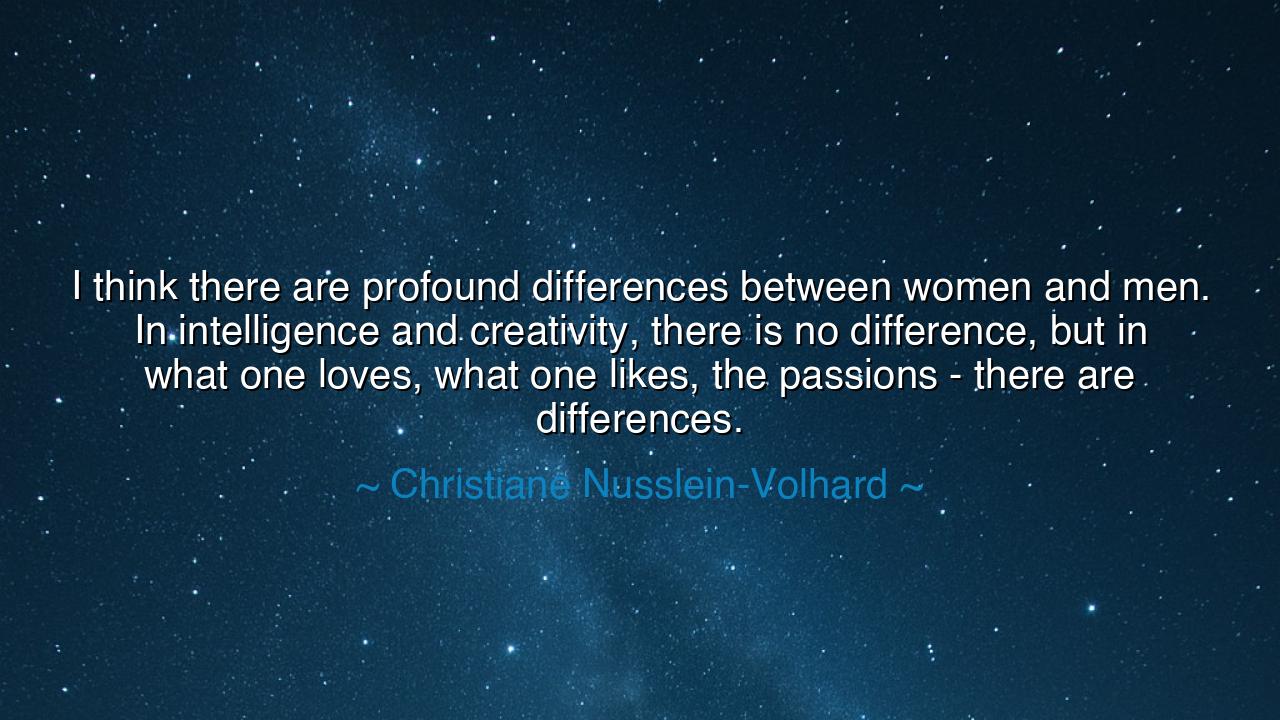
I think there are profound differences between women and men. In
I think there are profound differences between women and men. In intelligence and creativity, there is no difference, but in what one loves, what one likes, the passions - there are differences.






Hearken, children of the ages, and attend to the wisdom of Christiane Nüsslein-Volhard, a seeker of life’s hidden codes, who spoke: “I think there are profound differences between women and men. In intelligence and creativity, there is no difference, but in what one loves, what one likes, the passions—there are differences.” In this simple observation lies a truth both delicate and eternal: that while the mind may soar equally for all, the heart is colored by the unique inclinations that make each soul distinct.
From the dawn of civilization, philosophers have marveled at the diversity of human desire. Plato himself, in his dialogues, observed that while intellect may be universal, the ways in which men and women are drawn to the world, the choices that stir their spirits, often differ. Nüsslein-Volhard’s insight reminds us that the richness of life emerges not from sameness, but from the interplay of varied passions. Just as rivers carve unique paths through the earth, so too do human passions shape lives in ways both subtle and profound.
Consider the story of Marie Curie, who, though unmatched in intelligence and creativity, pursued her passions in the study of radioactive elements with a focus born from deep personal calling. Pierre Curie, equally brilliant, devoted himself to physics with a different energy, complementary yet distinct. Together, their union of minds produced discoveries that illuminated the world, yet each followed the pull of their own hearts. Herein lies Nüsslein-Volhard’s wisdom: equality of capability does not mean sameness of desire.
The differences in passion are not to divide, but to enrich. In the grand tapestry of history, men and women have pursued endeavors guided by their own loves: Joan of Arc followed a sacred call, while Leonardo da Vinci explored the mysteries of nature. Each, driven by what they cherished, reshaped the world in their own way. The lesson is clear: to understand humanity, one must honor not only the equal capacity for intellect but the diversity of what the heart yearns for.
Yet, let no one misread this insight as a hierarchy of value. The ancients taught that the soul’s worth is measured not by conformity, but by fidelity to one’s own inclinations and passions. A person may be brilliant, but unless they embrace the call of their own heart, their life risks sterility of meaning. The profundity of differences lies not in superiority, but in the beauty of variation, the harmony born of contrasting yet complementary forces.
Even in contemporary life, we witness this truth daily. Artists, scientists, leaders, and thinkers follow diverse paths, often shaped by the subtle compass of personal passion rather than mere aptitude. Recognition of these differences fosters empathy and cooperation: when one honors another’s passions, they discover opportunities for collaboration and understanding that transcend superficial distinctions. Here, Nüsslein-Volhard’s teaching becomes a guide for social harmony as well as personal fulfillment.
Practical wisdom emerges from this understanding. Reflect upon your own passions, and honor them without fear of comparison. Seek the pursuits that stir your heart, and respect those that stir the hearts of others. In relationships, in work, and in creation, recognize that equality of mind does not erase the beauty of different loves. Collaboration and unity flourish when diversity of desire is seen not as a fault, but as a strength.
Finally, remember this eternal truth: the world’s brilliance is built upon the interplay of intellect and passion, on minds equal in capacity but hearts diverse in longing. By embracing both equality of ability and the richness of differences in desire, one lives fully, contributes profoundly, and honors the sacred variety that makes life itself a work of art. The wisdom of Christiane Nüsslein-Volhard endures as a call to courage, reflection, and celebration of the soul’s unique compass.
If you wish, I can also craft a short, poetic version of this reflection suitable for oral narration, emphasizing the rhythm of intellect and passion across the human experience. Do you want me to do that?






AAdministratorAdministrator
Welcome, honored guests. Please leave a comment, we will respond soon